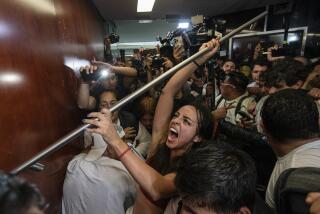Parties Restart Reform Talks
- Share via
MEXICO CITY — After months of boycotts, walkouts and rancorous debate, Mexico’s three main opposition parties finally sat down with the nation’s long-ruling Institutional Revolutionary Party on Tuesday, restarting talks that President Ernesto Zedillo has vowed will reform Mexico’s authoritarian political system.
The opposition party leaders used the renewal session of the National Dialogue on Political Reform to warn that time is running out. Mexico’s archaic politics, combined with one of the worst economic crises in the nation’s modern history, may yet unleash a wave of social unrest that so far has remained just beneath the surface, they said.
But after all four parties stated their commitment to forging a new era of Mexican federalism and democracy, an invited member of the left-leaning Democratic Revolutionary Party, or PRD, stood in silent protest, just moments after Zedillo’s Interior secretary and point man for democratic reform began speaking at the forum. She held up a handwritten sign for the duration of Interior Secretary Emilio Chuayffet’s speech, just 10 feet from his face at the center of the 30-foot table. It declared, “Freedom for Fernando Yanez.”
Yanez, also known as Commander German, is a leader and an alleged co-founder of the armed Indian rebel group in the southern state of Chiapas. He was arrested by federal police in Mexico City over the weekend. Yanez remains in jail on gun charges that the government asserts are unrelated to his role in the Zapatista National Liberation Army.
Yanez’s capture could threaten fragile peace talks between Chuayffet’s department and the Zapatistas, whose Jan. 1, 1994, armed uprising left at least 145 people dead. And Tuesday’s protest underscored how far apart Mexico’s political forces remain as their leaders again begin a process that Zedillo has vowed will usher Mexico into the 21st Century as a genuine democracy.
In recapping the reform effort that began when the president convened the first all-party reform talks in January, Chuayffet conceded that the economic crisis that erupted just two weeks after the president took office in December has complicated the process. The December peso devaluation triggered a series of harsh government measures, including sharp tax increases, that caused the PRD to pull out of the talks in April. The conservative National Action Party, or PAN, withdrew in May.
“In spite of the crisis, we want reform,” Chuayffet declared, just before Nuria Fernandez stood up in protest. “We know democracy is no immediate guarantee of prosperity, but it is very clear to us that economic well-being is not desirable at the cost of freedom.”
Santiago Onate, president of the Institutional Revolutionary Party, or PRI, said his party remains committed to both electoral and internal reforms, which many political analysts say could well drive it from power for the first time in 66 years.
Carlos Castillo Peraza, president of PAN, repeated his party’s stance that the dialogue is instrumental to a reform process that analysts say could bring the opposition into the presidency for the first time during elections in the year 2000. But Castillo, along with the president of the small Workers Party, stressed the urgency of bringing social peace.
More to Read
Sign up for Essential California
The most important California stories and recommendations in your inbox every morning.
You may occasionally receive promotional content from the Los Angeles Times.













